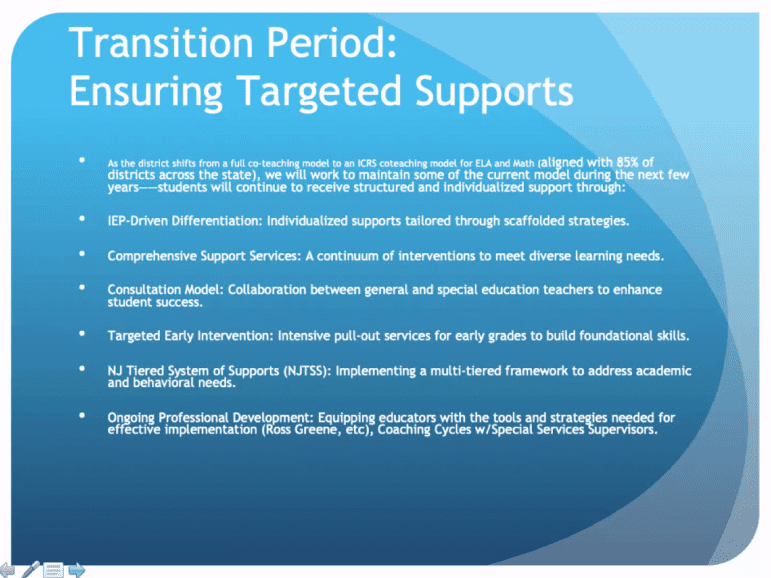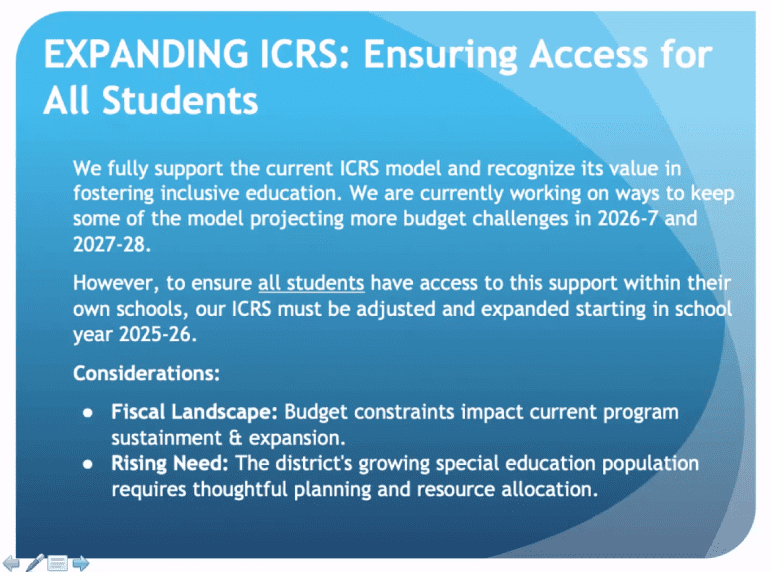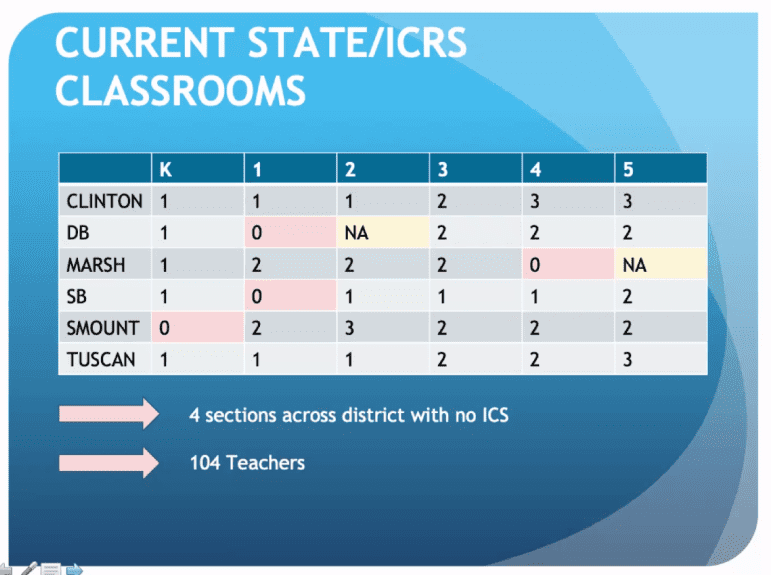An approaching “fiscal cliff” is forcing the South Orange-Maplewood School District to make difficult choices, including possible reductions in staffing impacting special education inclusion classrooms in elementary schools.
“Unfortunately, we have to make some difficult decisions moving forward,” said Supt. Jason Bing at a webinar with parents on Feb. 24.
The difficult decision under discussion for the 2025-26 school year: Shifting from a full co-teaching model for all subjects for elementary school inclusion classrooms, to a co-teaching model for English Language Arts and Math (and not science and social studies). A district slide presentation noted that this was a model “aligned with 85% of districts across the state.”

Noting that the “changes we are discussing will not be implemented this school year,” Bing said the administration was “interested in getting some feedback from our public. That’s why the questions are important to us, and that’s why we’re holding multiple town halls around this issue.”
Note: An in-person town hall will take place on Feb. 25 at The Baird, 5 Mead Street, South Orange, NJ at 6:30 p.m. It is a general information town hall with Bing.
Bing was joined on the webinar by Kathleen Gesumaria, the SOMSD assistant supt. of special services, who started in the job six months ago. “She stepped into a situation that she did not create and a budget that is not hers,” said Bing, who is new to the district and participating in his first budget cycle.

Bing said that the proposal has been crafted after carefully studying two audits of the district — one federal and one commissioned by the Board of Education. He said that he and Gesumaria absorbed the information, asked questions, “reflected and also started developing some planning to avoid some fiscal hardship moving forward.” Bing said he and staff did outreach with SEPAC – the Special Education Parents Advisory Committee, at after school meetings, Child Study Team meetings and trainings, principal meetings, assistant principal meetings, the President’s Council, PTA town halls and more.
“One of our challenges coming in, and one of our mandates coming in from our community members was the issue of not having in-class resource support [ICRS] at all grade levels in all of our buildings — meaning that some of our buildings, I believe four of them, at different grade levels, do not have in-class resource support classrooms currently,” said Bing.

“So what that means is, if I have a child and that child is classified, for example, at the end of second grade, and that child’s going into third grade next year with a new IEP [Individualized Education Programs], and that IEP is stating in-class resource support, that child would have to be removed from their building and sent to another school because the school does not have in-class resource support in third grade,” said Bing.
“We are trying to fill those gaps,” said Bing, “in order to make sure that in-class resource support is at every grade level in every school, so no child has to be pushed out of their school in order to get in class resource support, which is really one of the more least restrictive models in the special education continuum.”
Bing said, “We also are currently working on ways to look at our current model, which, those of you are familiar is a co-teaching bonded model, where two full-time teachers are in the same classroom all day. Looking at our budget, it’s going to be very difficult to maintain that model moving forward.”
With out giving specific numbers, Bing painted a dire budget outlook, saying that increases in the state aid formula fell far short of making up for increased costs in areas like health care.

Bing noted the South Orange Maplewood School District had already had a taste of the “fiscal cliff” last year with 28 reductions in force (RIFs) and also a 35% budget cut through all budget lines except special education.
“We are currently waiting on state aid numbers. They should be coming in later this week to determine how deep our deficit will be. And yes, there will be another deficit. As many of you know, there was a $9 million deficit last year that required reductions in the force and also program cuts and budget line cuts across the entire budget. We’ll keep all services in place for the remainder of this school year,” said Bing.
“We are holding these town halls and working with folks to collaborate to figure out what our future is going to look like in the current fiscal landscape that we are looking at for 2025-26, and also 2026-27 and 2027-28.”
Parents discussed the changes heatedly in online forums and one parent emailed Village Green to say, “Parents are particularly mad because, they contend, they were not consulted on the actual needs of their children. Just, poof, one day support for their children was removed from the IEPs for immediate implementation.”
The parent said that parents wanted to be included in the discussions sooner: “parents feel they were never actually told this was happening. It all came to a head last week, when IEP meetings took place with parents, teachers, and child study teams.”
However, Bing insisted that no decisions had yet been made or implemented:

Watch the video of a similar webinar that took place on Friday, Feb. 21, here:

